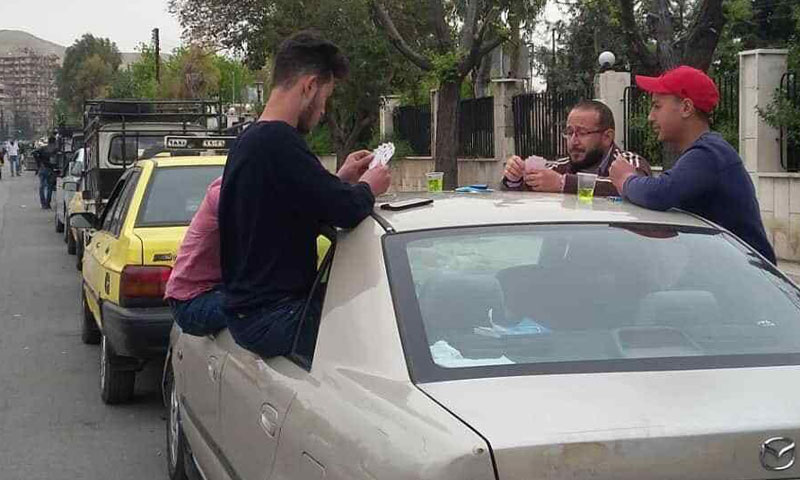



Gas stations in the northern countryside of Homs in central Syria are overcrowded, with cars waiting in long queues for fuel allocations as a result of the arrival of gas to the stations via irregular batches, coupled with the region residents’ great needs and high prices on the black market.
Residents are trying to get gas with the “smart card,” which gives them a certain amount of fuel at the subsidized price of the Syrian regime’s government.
This has created a new type of “mafia” in the region, whose mission is to collect citizens’ dues through ties that link their mediators with gas station owners and gas sales centers, in exchange for extra cash for those people, making smart card owners avoid waiting in overcrowded queues.
The Ministry of Oil and Natural Resources sets the price of diesel at 180 Syrian Pounds, gasoline at 225 Syrian Pounds and gas at 2,500 Syrian Pounds per bottle. However, prices on the black market may reach up to 425 Syrian Pounds for gasoline, while gas and diesel are not available.
With the return of the northern countryside of Homs under the control of the regime forces, for more than a year, the government regularized the subsidies through smart card. However, fuels reach the gas stations only three times a month, and in the case of availability of gasoline or diesel, the hustle starts before the tanks unload in gas stations.
Abu Mohammad, a gas station owner in Houla Region in the northern countryside of Homs, told Enab Baladi that all gas stations are supplied with fuels only about once every ten days.
He attributed the delay of the stations’ supply with gas to what he described as “corruption” in the oil refinery and Sadcob Company, as it is possible to obtain additional quantities of fuel in return for large sums of money or through the gas station owner’s strong ties with officers of the security offices, who in turn exert great pressure on officials to increase the number of times of the station’s refueling.,
The owner of the station explained that the distributed quantities of fuel to the stations are insufficient for the specified allocations for the smart card owners, which leads to large overcrowding several hours before the arrival of the tanks. He pointed out that the allocations in the smart card have specific dates to be obtained, and if exceeded by the card owners, they lose their right to obtain them, which increases the overcrowding.
Taxi drivers are one of the most important sources of fuel supply to the black market. They have been active in selling gasoline to street traders during the opposition’s control over the northern countryside of Homs, through their ties with the gas station owners in the center of Homs.
The difficulty in obtaining subsidized fuels in the region prompted drivers to return to their activity and use their ties with gas station owners, in order to solicit the citizens’ fuel allocations, in return for a sum of money they obtain per each liter or an increase in the price of a gas bottle.
Nader, a taxi driver from the town of Talbiseh, told Enab Baladi that the nature of his work requires him to build relationships with gas station owners, so that he can get gasoline whenever he wants. This prompted his neighbors and relatives to ask him to get their allocations in return for 25 Syrian Pounds per liter.
“This activity started from here until it became more organized, and my work started to expand,” Nader added, explaining: “For every card I get its allocations I earn about 5,000 Syrian Pounds a month. By virtue of my ties with gas station owners, I can obtain their allocations on time without losing any amount, and I make the card owner avoid overcrowding in the gas stations.”
Nader’s work is not limited to soliciting gas, but also includes the obtention and changing of gas bottles for the beneficiaries in return for 1,000 Pounds, sparing the cardholder problems to get his dues.
Since August 2018, the Ministry of Oil and Natural Resources has started a gradual imposition of a smart card system in the Syrian governorates.
The ministry identified five vehicle segments to obtain fuel through the smart card. The first of these includes the private vehicles and vehicles belonging to private economic activities, which will get 100 liters per month, motorcycles 25 liters, public cars and public transport vehicles 350 liters per month at a price of 225 Syrian Pounds.
Government vehicles, whose allocations are less than 100 liters, are allowed to be supplied with gasoline up to 100 liters like the private cars, while generators, tractors and agricultural equipment are allowed to be supplied with gasoline at the unsubsidized price of 375 Syrian Pounds.
Any amount in excess of subsidies will be sold at the variable prime cost, as the case for any vehicle that does not carry a Syrian or non-Syrian smart card, with the implementation of the resolution in May.
if you think the article contain wrong information or you have additional details Send Correction